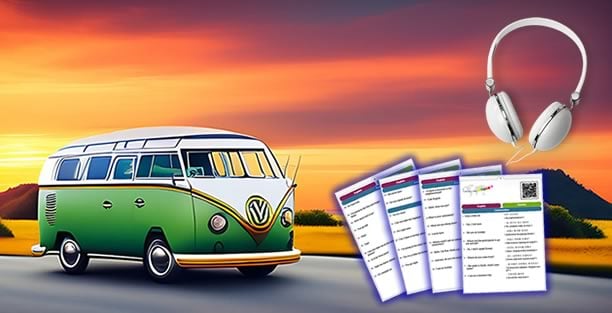Learn Portuguese
| English | Portuguese | |||
|---|---|---|---|---|
| Hello | Bom dia | |||
| Hi! | Olá! | |||
| Good evening | Boa noite | |||
| Good evening | Boa tarde | |||
| Goodbye | Adeus | |||
| See you later | Até Logo | |||
| Yes | Sim | |||
| No | Não | |||
| Please! | Por favor! | |||
| Please! | Se faz favor | |||
| Thanks | Obrigado | |||
| Thanks | Obrigada | |||
| Thanks a lot | Muito obrigada! | |||
| Thanks a lot | Muito obrigado! | |||
| Thank you for your help | Obrigado pela sua ajuda | |||
| Thank you for your help | Obrigada pela sua ajuda | |||
| Don't mention it | De nada | |||
| Ok | Está bem ! | |||
| Ok | De acordo ! | |||
| How much is it? | Quanto custa por favor? | |||
| Sorry! | Desculpe ! | |||
| I don't understand | Não compreendo | |||
| I get it | Compreendi | |||
| I don't know | Não sei | |||
| Forbidden | Proibido | |||
| Excuse me, where are the toilets? | Onde é a casa de banho por favor? | |||
| Happy New Year! | Feliz ano novo! | |||
| Happy birthday! | Feliz aniversario! | |||
| Happy holiday! | Boas festas! | |||
| Congratulations! | Felicidades! | |||
| Congratulations! | Parabéns |
Essential Portuguese lessons for beginners
If you’re a beginner, start with simple dialogues, greetings, and essential expressions to build confidence.
We have designed an objective and efficient approach to help you practice Portuguese and learn it quickly. Our method starts by memorizing essential Portuguese phrases, expressions, and Portuguese vocabulary useful in daily life or while traveling.
Getting used to pronouncing words aloud—like numbers—is a simple yet effective exercise you can do anytime.
This will make Portuguese pronunciation feel more familiar, easing your journey into this beautiful language.
And once you travel to Lisbon, Portugal, or Rio de Janeiro, Brazil, you will be surprised at how much easier it is to understand and communicate.
Additionally, using a pocket dictionary can help you find the translation of new Portuguese words and expand your knowledge.
Why speak Portuguese while traveling?
European Portuguese: A Cultural Treasure
Portugal, one of Europe’s oldest countries, has a unique cultural heritage shaped by multiple influences. Each region has a distinct character, and speaking with Portuguese people—known for their hospitality—will make your stay truly enriching.
Brazilian Portuguese: A Language Spoken Across Continents
Portuguese ranks as the 6th most spoken language worldwide and the 5th most used language on the internet. It is spoken not only in Europe but also in Africa (Mozambique, Angola, Cape Verde) and Asia (Macao, East Timor). While there are different dialects, the language remains largely uniform.
Learn a Wonderful Language for Professional Growth
Many companies are expanding into Brazil and seeking employees who can communicate in Portuguese. Its economic strength ensures its importance will continue to grow. By learning it today, you prepare for future opportunities in business and international relations.
Make the Most of Your Travel Experience
Whether you're visiting for leisure or a business trip, speaking a few words of Portuguese will earn you appreciation and facilitate meaningful interactions.
How to improve your portuguese pronunciation in a few weeks?
There are no fixed rules when learning a language on your own. The key is self-confidence and a natural curiosity to explore.
Stay motivated by focusing on what inspired you to learn: Fado music, Brazilian football, the poetry of Pessoa, or simply your upcoming trip to the Rio Carnival. Prioritizing your interests will help sustain your enthusiasm and make learning feel effortless.
Portuguese grammar includes melodic and nasal tones, making pronunciation distinct. Understanding word stress and the special "tilde (~)" accent will help with correct pronunciation. But true mastery comes from immersion—listening, speaking, and practicing.
The best books to learn Portuguese
Using books alongside other resources like online courses and apps can accelerate your learning.
Discover some of the most remarkable books from Portuguese and Brazilian literature.
Portuguese authors
- Os Lusíadas– Luís de Camões (An epic poem about the Portuguese discoveries, a cornerstone of Portuguese literature.)
- O Ano da Morte de Ricardo Reis– José Saramago (A fascinating novel blending history and fiction, from the Nobel Prize-winning author.)
- Memorial do Convento– José Saramago (A historical novel about the construction of a convent in the 18th century.)
- Aparição– Vergílio Ferreira (A philosophical novel exploring existentialist themes.)
- A Cidade e as Serras– Eça de Queirós (A classic novel about the contrast between city and rural life.)
- O Crime do Padre Amaro– Eça de Queirós (A critique of the clergy and society in 19th-century Portugal.)
- Livro do Desassossego– Fernando Pessoa (A masterpiece of Portuguese modernism, blending fiction and poetry.)
Brazilian Authors
- Dom Casmurro– Machado de Assis (A psychological novel about love, jealousy, and unreliable narration.)
- Memórias Póstumas de Brás Cubas– Machado de Assis (A satirical novel narrated by a dead man.)
- Grande Sertão: Veredas– João Guimarães Rosa (An epic novel exploring the life and struggles of the Brazilian backlands.)
- O Cortiço– Aluísio Azevedo (A realist novel about social issues in 19th-century Brazil.)
- Vidas Secas– Graciliano Ramos (A novel depicting the harsh reality of drought-stricken northeastern Brazil.)
- Capitães da Areia– Jorge Amado (A social novel about street children in Salvador, Bahia.)
- A Hora da Estrela– Clarice Lispector (A moving novel about identity and marginalization.)
How to learn Brazilian Portuguese effectively
Brazilian Portuguese differs significantly from European Portuguese in pronunciation, vocabulary, and even grammar. While both share the same roots, their evolution over time has led to distinct variations, much like the differences between American and British English.
One of the most noticeable distinctions is pronunciation: Brazilian Portuguese has a more open, melodic, and rhythmic intonation, often compared to a "singing" style. The vowels tend to be more pronounced, and words are spoken with a smoother, more flowing cadence. In contrast, European Portuguese has a more closed and muted pronunciation, with syllables often blending together, making it harder for beginners to distinguish words.
Additionally, everyday vocabulary varies between the two versions. For example, "bus" is ônibus in Brazil but autocarro in Portugal. Similarly, "cell phone" is celular in Brazil and telemóvel in Portugal. These differences can sometimes create misunderstandings, especially for beginners.
Even verb usage and grammar structures have slight variations. Brazilian Portuguese tends to favor simpler constructions and often omits direct object pronouns in casual speech, making it more accessible to learners. Meanwhile, European Portuguese maintains a more formal and traditional grammatical structure.
If you want to sound like a native speaker of Brazilian Portuguese, it’s essential to practice with audio lessons that expose you to the Brazilian accent. Watching Brazilian TV shows, listening to Portuguese podcasts, and interacting with Brazilian speakers will help you internalize the rhythm and nuances of the language.
Tips for learning European Portuguese
European Portuguese differs slightly in pronunciation and vocabulary from the Brazilian variant. Choose a Portuguese course designed for European learners if you wish to focus on this dialect.
Master the basics of Portuguese grammar easily
Learning Portuguese grammarmay seem challenging, but focusing on basic rules and practicing regularly will make it easier.
1. Noun Gender and Agreement
In Portuguese, nouns have a gender: masculine or feminine. Most nouns ending in "-o" are masculine (carro- car), while those ending in "-a" are feminine (casa- house). Adjectives and articles must agree with the noun in gender and number.
- O carro vermelho (The red car - masculine)
- A casa vermelha (The red house - feminine)
2. Verb Conjugation and Tenses
Portuguese verbs change depending on the subject and tense. There are three main verb endings:-ar, -er, -ir.
- Falar (to speak): Eufalo, vocêfala, nósfalamos.
- Comer (to eat): Eucomo, vocêcome, nóscomemos.
- Abrir (to open): Euabro, vocêabre, nósabrimos.
Mastering verb tenses, especially the present, past (pretérito), and future, is crucial for fluency.
3. Definite and Indefinite Articles
In Portuguese, articles must match the gender and number of the noun.
- Definite Articles (The): o (masc. sing.), a (fem. sing.), os (masc. plural), as (fem. plural).
- Indefinite Articles ( A/An): um (masc. sing.), uma (fem. sing.), uns (masc. plural), umas (fem. plural).
Example: O menino (The boy), A menina (The girl).
4. Subject Pronouns and Omission
Unlike English, subject pronouns (eu, você, ele/ela) are often omitted in Portuguese because the verb conjugation already indicates the subject.
- Eu falo português (I speak Portuguese) → Can be simply Falo português.
- Ela come pão (She eats bread) → Can be simply Come pão.
5. Use of Prepositions
Prepositions likeem, de, para, por are commonly used but can be tricky for learners.
- Estou em casa (I am at home).
- Vou para o Brasil (I am going to Brazil).
- Este livro é de João (This book belongs to João).
Prepositions often contract with definite articles: em + a = na(na escola – at school).
By focusing on these fundamental grammar points and practicing regularly, you will build a strong foundation in Portuguese grammar!
Best podcasts to practice Portuguese
Listening to Portuguese podcastsis an excellent way to improvelistening comprehensionand immerse yourself in the language.
- Todo Mundo Pod– This podcast covers Brazilian history, culture, and language tips. The host speaks clearly, making it suitable for beginners.
- Portuguese With Carla Podcast– Designed for learners of European Portuguese, this podcast includes dialogues, idiomatic expressions, and grammar explanations.
- Practice Portuguese– Aimed at students of European Portuguese, this podcast features real-life conversations and cultural insights to enhance listening skills.
- Speaking Brazilian Podcast– Ideal for those learning Brazilian Portuguese, this podcast focuses on grammar, vocabulary, and pronunciation.
- Carioca Connection– A great podcast for improving your understanding of Brazilian Portuguesethrough authentic, casual conversations.
- Lingua da Gente– This podcast provides practical, everyday dialogues in Brazilian Portuguese, making it useful for learners of all levels.
- Fala Gringo– Focuses on helping non-native speakers become more comfortable with Brazilian Portuguese through storytelling and real-life examples.
Best ways to practice Portuguese
To improve fluency, engage in active learning: speak with a tutor, watch Portuguese shows with Portuguese subtitles, and practice writing.
Effective tips to learn Portuguese faster
1. Use books, apps like Loecsen, and online Portuguese classes.
2. Watch movies with Portuguese subtitles.
3. Speak with native speakers.
4. Listen to Portuguese songs and podcasts.
5. Write down new Portuguese words daily.
6. Study Portuguese verbs and grammar progressively.
7. Enjoy the process and embrace the Brazilian culture!
With dedication and the right resources, you’ll be speaking this wonderful language fluently in no time!





